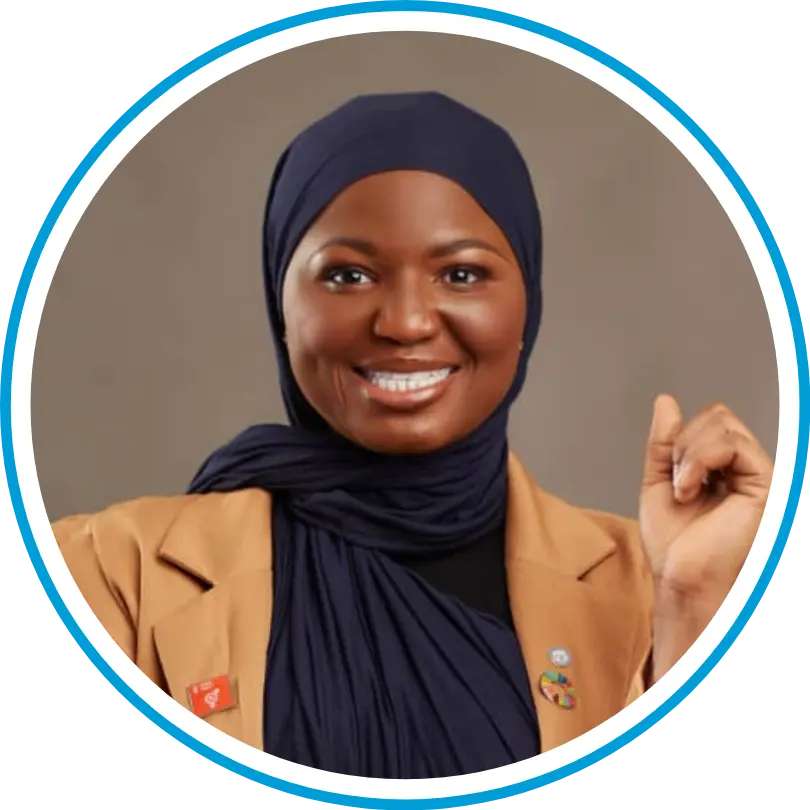Hiqmat Sungdeme Saani
Hiqmat Saani is a digital transformation and communications professional from Ghana’s Upper West Region, a historically underrepresented area. As founder of Paahibu Space, she has reached over 10,000 women and girls with training in digital skills, entrepreneurship, and cybersecurity. Her work is driven by personal experience and a clear vision: women must be not just consumers of technology, but creators, decision-makers, and leaders in the digital age.

What does your work focus on?
What would the digital world look like if women had equal access, not just to technology, but to the power to own, lead and shape it?
In many parts of the world, including Ghana, the digital landscape is still built for men, by men. Women and girls remain underrepresented in tech development, vulnerable in online spaces, and excluded from digital economic opportunities. My work exists to change that.
Growing up in Ghana’s Upper West Region, I personally experienced and witnessed the barriers that prevent girls and women from accessing digital opportunities—from lack of internet access to gender-based discrimination in STEM and digital entrepreneurship. I experienced the struggles of being disconnected due to unreliable electricity, low awareness about digital tools, little to no knowledge about online safety and internet access, forcing me to miss out on education during the COVID-19 pandemic. These experiences fueled my commitment to creating pathways for women and girls to participate meaningfully in the digital economy, technology development, and online governance.
As the Founder of Paahibu Space, a technology, education, and entrepreneurship development organization, I lead initiatives that equip girls, women-owned businesses, and female entrepreneurs with digital skills to create pathways for educational access and economic independence. My work bridges the digital gender gap by ensuring women are not just consumers of technology but creators, decision-makers, and leaders in the digital age.
One of my flagship programs, SecureTechsiStars, focuses on online safety, cybersecurity awareness, and digital resilience for young women. It equips them with the knowledge to protect themselves online, counter digital threats, and advocate for safer internet policies. This initiative has impacted hundreds of young women, ensuring they can confidently engage in the digital space without fear of harassment, exploitation, or cybercrime.
Through the Women in Digital Business Initiative, I provide training in digital marketing, financial technology, and e-commerce to help women-led businesses leverage technology for growth. Many women in underserved communities have scaled their businesses, accessed new markets, and secured financial independence using digital tools.
Beyond training programs, I am actively engaged in policy advocacy and internet governance. I co-led a Pan-African research project on online sexual exploitation, abuse, and digital rights to influence internet safety policies for girls. I also developed a policy brief advocating for social media regulations that protect young women online. My contributions have been recognized in global forums such as CSW67 and Plan International digital policy discussions.
I believe digital transformation should dismantle, rather than reinforce, gender inequalities. My work ensures that women and girls are not just included in digital spaces but are actively shaping and owning their evolution.
What is the impact and scalability?
When women gain digital skills, they do more than access technology — they transform industries, economies, and communities.
Through Paahibu Space, I’ve reached over 10,000 women and girls across 62 communities in Ghana and beyond, providing training in digital literacy, entrepreneurship, and advocacy.
SecureTechsiStars has trained over 1,500 students, teachers, and guardians in online safety, digital literacy, and digital rights. Many alumni have become cybersecurity advocates and trainers in their communities. Our research has influenced national and regional policy conversations on internet governance.
The Women in Digital Business and Women in Digital Economy initiatives have supported over 800 women entrepreneurs, with over 70% reporting increased income and business growth. These women are now accessing new markets and economic opportunities far beyond their local communities.
My policy advocacy work has shaped digital safety policies. I’ve co-led research on online exploitation, presented social media safety recommendations to governments, and contributed to global policy discussions at CSW67 and AU–EU digital dialogues.
Our programs are designed for long-term scalability. SecureTechsiStars is evolving into a pan-African mentorship network, while the Women in Digital Economy Initiative is integrating AI-based coaching and training tools. My global collaborations are also contributing to gender-sensitive cybersecurity and AI ethics frameworks.

What does being selected as an ITU160 Gender Champion mean to you, and how will you use this platform?
Tech power often feels distant — concentrated in places like Silicon Valley. One of the surest ways to bring that power to underserved communities is by amplifying their voices and experiences.
The future of digital transformation cannot be gender-blind. If women aren’t leading and shaping technology, the digital world will only reproduce existing inequalities. I want to be an ITU 160th Gender Champion because my work is rooted in a deep commitment to ensuring women are not just passive consumers of technology but active creators, leaders, and decision-makers in digital transformation.
Growing up in Ghana with limited digital access and gender bias made it clear to me how exclusion works, and what it takes to change it. Through Paahibu Space, I’ve helped over 10,000 women and girls build digital confidence and skills.
From launching SecureTechsiStars to empowering women entrepreneurs, my goal is to make technology an enabler, not a barrier. But real change requires more than programs — it needs policy. That’s why I’ve worked with governments, global organizations, and companies like Telenor Group to advocate for inclusive, gender-sensitive digital policies.
My research has shaped conversations on digital rights and safety at platforms like CSW67. As a Gender Champion, I would take this further by working with global stakeholders to design policies that center women’s experiences in digital transformation.
This platform would help amplify voices from the Global South, often left out of global tech decisions. My lived experience and expertise in gender and digital transformation can bring a critical, often overlooked perspective to global discussions at ITU, WSIS+20, and the AI for Good Global Summit.
Additionally, I am eager to co-design and facilitate a workshop on promoting gender equality in digital transformation. I would use my program development and advocacy experience to create an impactful session and connect with other young leaders to develop sustainable solutions. Becoming an ITU 160th Gender Champion is an opportunity to bring the silent voices in.